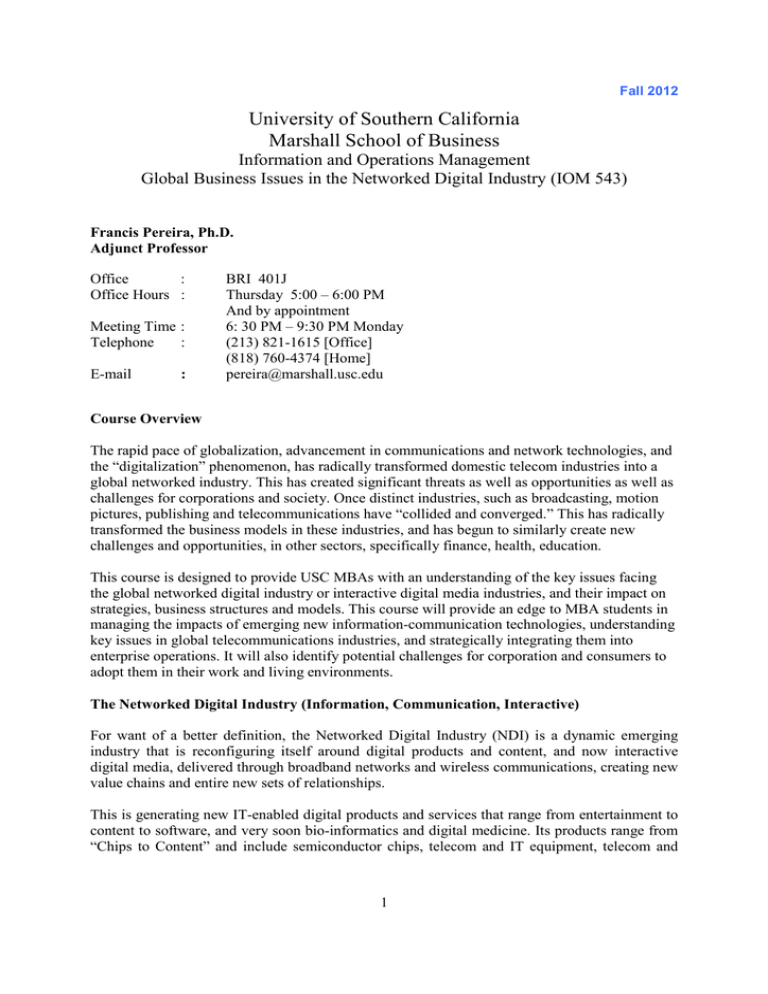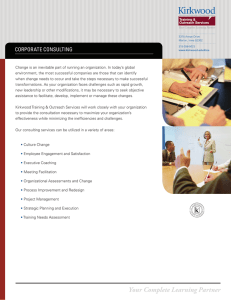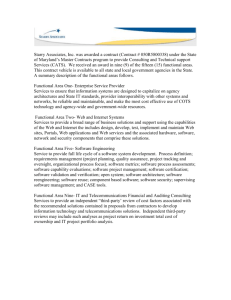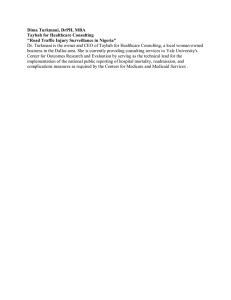University of Southern California Marshall School of Business
advertisement

Fall 2012 University of Southern California Marshall School of Business Information and Operations Management Global Business Issues in the Networked Digital Industry (IOM 543) Francis Pereira, Ph.D. Adjunct Professor Office : Office Hours : Meeting Time : Telephone : E-mail : BRI 401J Thursday 5:00 – 6:00 PM And by appointment 6: 30 PM – 9:30 PM Monday (213) 821-1615 [Office] (818) 760-4374 [Home] pereira@marshall.usc.edu Course Overview The rapid pace of globalization, advancement in communications and network technologies, and the “digitalization” phenomenon, has radically transformed domestic telecom industries into a global networked industry. This has created significant threats as well as opportunities as well as challenges for corporations and society. Once distinct industries, such as broadcasting, motion pictures, publishing and telecommunications have “collided and converged.” This has radically transformed the business models in these industries, and has begun to similarly create new challenges and opportunities, in other sectors, specifically finance, health, education. This course is designed to provide USC MBAs with an understanding of the key issues facing the global networked digital industry or interactive digital media industries, and their impact on strategies, business structures and models. This course will provide an edge to MBA students in managing the impacts of emerging new information-communication technologies, understanding key issues in global telecommunications industries, and strategically integrating them into enterprise operations. It will also identify potential challenges for corporation and consumers to adopt them in their work and living environments. The Networked Digital Industry (Information, Communication, Interactive) For want of a better definition, the Networked Digital Industry (NDI) is a dynamic emerging industry that is reconfiguring itself around digital products and content, and now interactive digital media, delivered through broadband networks and wireless communications, creating new value chains and entire new sets of relationships. This is generating new IT-enabled digital products and services that range from entertainment to content to software, and very soon bio-informatics and digital medicine. Its products range from “Chips to Content” and include semiconductor chips, telecom and IT equipment, telecom and 1 Fall 2012 internet network services, computer software, cyber-security and privacy, online business content and online entertainment and gaming, and data mining. Course Objectives: The course is meant to familiarize the MBA with the key technologies, new growth areas and issues in this global industry and will include: (a) the new communication and information technologies, such as Voice over IP (VoIP), 4G, Web 2.0 and cloud computing (b) the effects of these technologies on business models for the global network service provider; (c) the effects of these new technologies on corporate structure, productivity and business models (d) the role of mobility and wireless applications in the economy and society (e) new growth areas, such as e-Health, Smart Grid and Telematics (f) the role of new information technologies on economic development and society Course Requirement: There are two major components of this course Individual Performance: Thought paper & Case Write-ups: The first component involves a 6-7 page (double-spaced) thought paper and two, 2-page case write-ups [one each from CS1-6 and CS7-13]. Questions will be provided to guide your writeup. In addition, students working in teams of two, will be responsible for one case presentation on a specified question (selected case presentation cannot be the same as the individual case writeups). The assigned readings and cases are designed to help you understand the key issues, underlying concepts, enabling technologies, and effective techniques for information systems management. All arguments should be substantiated by clear logic and case specifics. Incorporation of learning from assigned readings and class material into analysis is a plus. Team Consulting Project The consulting project is designed for MBA students to work in teams of between 4-5 students directly with executives from sponsor companies on a specified company project. The teams are expected to have bi-weekly tele-conferences with the project sponsors, to provide them with updates on the progress of the project. Corporate sponsors will be invited to attend the final presentation. This project offers valuable real-world consulting and research experience and offers students a potential for future hire. The consulting project will include a 8 -10 page typed extended executive summary, with highlights presented in a 30 minute class presentation. Please note that the University has signed Non-Disclosure Agreements with some of the sponsors on these projects. Grading: A tentative point distribution is shown below: Thought Paper: Case Assignment & Presentation: 80 80 2 Fall 2012 Term Consulting Project: Midterm Presentation: Final Presentation Final report: Class Participation: 300 80 80 140 40 The grade for the consulting project will be based on team members, sponsor and instructor evaluation. For the peer evaluation portion, each team should decide whether individual evaluations should be base on assigned segments in the project, or contribution to the overall project. Class participation is essential to the learning experience. Articulating your ideas in this setting has several benefits for the class and your professional development. Most notably, active participation will surface novel ideas, encourage critical thinking, and lead to a more lively, interesting class. Required Readings Harvard Business School case studies, articles and other e-articles Optional Text (Background) P.J. Louis, Telecommunications Internetworking, McGraw Hill, 2000. Laptop Computer Policy Students may use laptop computers during the lecture period solely for note-taking purposes. However, these laptop computers may not be connected to the Internet or use to check e-mails during the lecture period. Notice on Academic Integrity The use of unauthorized material, communication with fellow students during an examination, attempting to benefit from the work of another student, and similar behavior that defeats the intent of an examination or other class work is unacceptable to the University. It is often difficult to distinguish between a culpable act and inadvertent behavior resulting from the nervous tensions accompanying examinations. Where a clear violation has occurred, however, the instructor may disqualify the student's work as unacceptable and assign a failing mark on the paper. For Students with Disabilities Any student requesting academic accommodations based on a disability is required to register with Disability Services and Programs (DSP) each semester. A letter of verification for approved accommodations can be obtained from DSP. Please be sure the letter is delivered to me as early in the semester as possible. DSP is located in STU 301 and is open 8:30 a.m. - 5:00 p.m., Monday through Friday. The phone number for DSP is (213) 740-0776. 3 Fall 2012 TENTATIVE SCHEDULE AND READING ASSIGNMENTS Week Aug 27 Topic and Readings Introduction and A View to The Future Comments Morris, Schindehutte & Allen, “The Enterpreneur’s Business Model: Towards a Unified Perspective,” Journal of Business Research, 58. (2005) 726-735. Berman, “3-D Printing: The New Industrial Revolution,” Business Horizons (2012) 5,155-162. Consulting Projects: Assignments Sep 3 Labor Day Sep 10 Telecommunication Technologies, Standards and Infrastructure: Rise of Mobile McKinsey, “Mobile Money: Getting to Scale in Emerging Markets,” Economist, “Mobile Marvels,” Special Report, September 26, 2009. Silverman & Whittig,” Google’s Android, “Will it Shake up the Wireless Industry in 2009 and Beyond,” Stanford Graduate Business School. July 28, 2009. [CS1] Guest Speaker Richard M. Grimmes Chief Executive Officer, Capital Tower Group. Sep 17 Creative Destruction in the Traditional Telecommunications Industry Dyer & Hatch, “Competing Against Free,” Harvard Business Review, June 2011. Schifrim & Burgleman, “France Telecom-Orange in 2011,” Stanford Graduate School of Business, June 22, 2011. (SM-194). [CS2] Kanter and Bird “Transforming Verizon: A Platform for Change,” Harvard Business School, April 2012 (9321-082). [CS3] 4 Consulting Projects: Methodologies Fall 2012 Guest Speaker Scott Wilson, Ph.D Senior Manager, Deloitte Research Technology, Media and Telecommunications Sep 24 Collisions and Convergence in Broadcasting and Movies Michael Smith et. al. “Converting Pirates Without Cannibalizing Purchasers.” Wharton School, November 2009. Anita Elberse & Sunil Gupta, “Hulu: An Evil Plot to Destroy the World?” Harvard Business School, June 29, 2010. 9-510-005 [CS4] Wesley & Dau, “Netflix Inc.: Moving Away from DVDs,” Ivey School of Business, 2012. [CS5] Guest Speaker: Melva Beniot SVP, Consumer Insights and Audience Research, Fox Corporation Oct 1 From Newspapers to e-Books: Challenges in Print Media Herter,” From Book Reviewing to Crowd-sourcing,” Searcher, June 2012. Bradley & Bartlett, “Book Publishing in 2010,” Harvard Business School, January 12, 2012. (9-711419). Bharat Anand et. al. “eReader: Amazon’s Kindle,” Harvard Business School, December 9, 2009. 9-709486 [CS6] Oct 8 Exploiting Multiple-Platforms in Digital Media Kaplan, “If You Love Something , Let it Go Mobile,” Business Horizons, (2012), 55, 129-139. 5 Consulting Projects: 1St Report Fall 2012 Deighton & Kornfeld, “Nettwerk: Digital Marketing in the Music Industry,” Harvard Business School, March 9, 2012 (9-510-055) [CS7] Elberse, Calhoun & Johnson, “The NFL’s Digital Media Strategy,” Harvard Business School, November 30, 2010. (9-511-055). [CS8] Ofek & Wagonfeld, “Sephora Direct: Investing in Social Media, Video, and Mobile,” Harvard Business School, June 25, 2012. (9-511-137). [CS9] Oct 15 Utilizing Social Networks for Mass Collaboration McKinsey, “The Social Side of Strategy,” May 2012. Doan et. al., “Crowd-sourcing Systems on the WorldWide Web,” Communications of the ACM, April 2011. Piskorski, Eisenmann, Chen and Feinstein, “Facebook Platform,” Harvard Business School, October 28, 2011. [CS10] Oct 22 The Cloud: Transforming Business Models across Industries Wienman, “Cloudonomics: Chapter 1,” Wiley & Sons, September 2012. Jones & Schramm, “Cloud Computing,” Supply Chain Management Review, May-June 2011. Levine & White, “A Crisis at the Hafford Furniture: Cloud Computing Case Study,: Journal of Cases on Information Technology, 13(1), 57-71, January-March 2011. [CS11] Guest Speaker: Joe Wienman SVP Telx, and Author of Cloudonomics 6 Fall 2012 Oct 29 Nov 5 Consulting Projects: Mid-Semester Presentations Next Frontiers of Growth in the Interactive Digital Media (I): e-Money & Big-Data McKinsey, “Big Data: The Next Frontier for Innovation, Competition and Productivity,” May 2011. Zainudeen et.al. “ CellBazaar; Enabling M-commerce in Bangladesh,” Information Technologies and International Development, 7:3:2011. Thomas Eisenmann and Lauren Barley, “PayPal Merchant Services,” Harvard Business School, March 13, 2007. [CS12] Nov 12 Next Frontiers of Growth in the Interactive Digital Media (II): Augmented Reality Serious Games and Telematics Wright, “Automotive Autonomy,” Communications of the ACM, July 2011. Kirk Kroeger, “Mainstreaming Augmented Reality,” Communications of the ACM, July 2010, Vol. 53., No. 7 Luis Von Ahn & Laura Dabbish “Designing Games With A Purpose” Communications of the ACM, August 2008, Vol. 51., No. 8. Guest Speaker Thilo Koslowski, VP, Automotive and Vehicular ICT, Gartner (Accepted Tentatively) Nov 19 Broadband in Society: From Smart Grids to Intelligent Nation Edwards, Grinter, Mahajan & Wetherall, “Advancing the State of Home Networking,” Communications of the ACM, June 2011. Ramchurn et. al., “Putting the ‘Smarts’ into the Smart Grid,” Communications of the ACM, April 2012. 7 Consulting Projects: Status Update Fall 2012 Robert Atkinson et. al. “The Digital Road to Recovery,” The Innovation and Technology Foundation, January 2009 Shin & Han, “How will Net Neutrality be played out in Korea,” Government Information Quarterly 29 (2012) Guest Speaker William Davidson, SVP Global Markets & Investor Relations Qualcomm Nov 26 Business Opportunities in e-Health Hamermseh, Barley & Graham, “Proteus Biomedical: Making Pigs Fly,” Harvard Business School, April 2, 2010. (9-809-051). [CS13] California Healthcare Foundation, “The Connected Patient: Charting the Vital Signs of Remote Monitoring.” February 2011. California Healthcare Foundation, “How Smartphones are Changing Health Care for Consumers and Providers.” April 2010. PWC, “HealthCare Unwired: New Business Models Delivering care Anywhere,” September 2010. (optional) Guest Speaker Anthony Shimkin Senior Director of Marketing Qualcomm Life Dec 3 Course Wrap-Up Consulting Projects: Preliminary Final Presentations Dec 10 Final Consulting Project Presentations to Sponsors* 8




